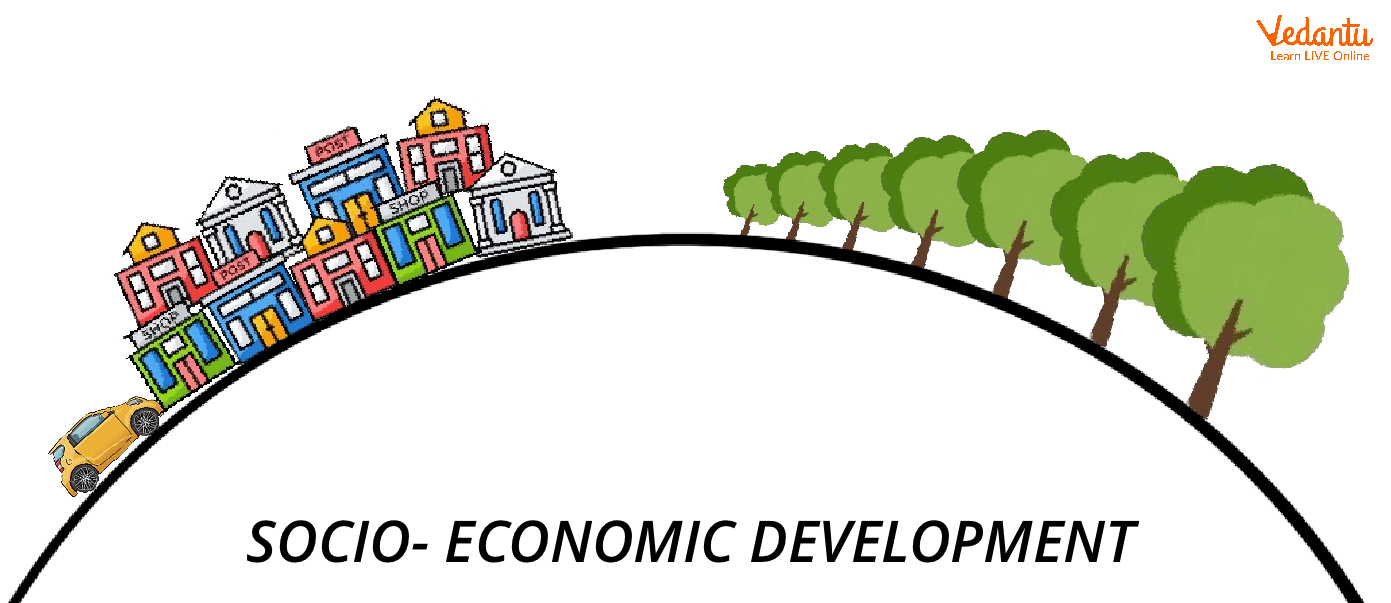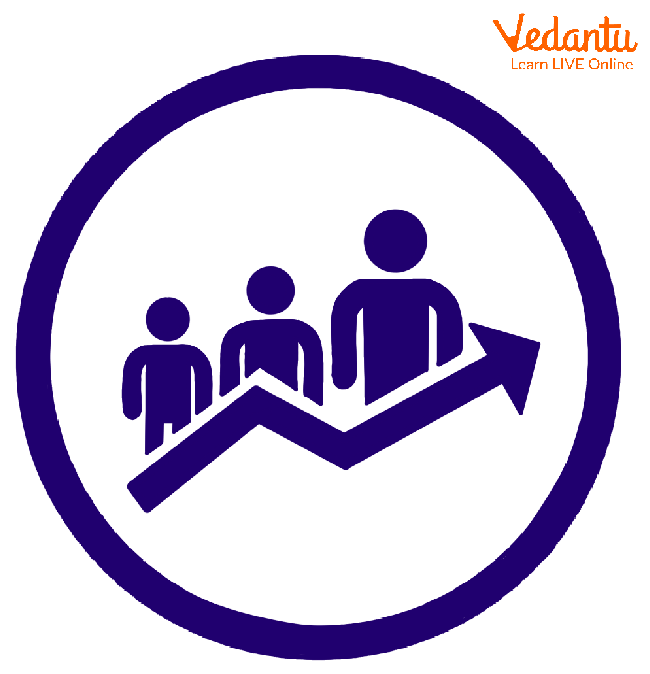




What is Development Economics?
Development Economics is a branch of economics that deals with fiscal, economic, and social conditions in developing countries. It is generally applied to the economies of the developing world. Development economics includes health, education, working conditions, and domestic and international policies as the focus area that helps a nation make social and economic progress.

Development Economics
Concept of Development
Development is a multidimensional process that deals with transformation in structure, acceleration of economic growth, reduction of inequality and eradication of poverty. It is used as a measure of human welfare. Amartya Sen defined the Capability Approach of development which contributed to the development of the Human Development Index which is used to measure the economic development of societies.
Economic and Social Development
Economic development deals with economic growth, and non-economic factors are also considered in the process. Social development connotes moving towards a better social living. The features of economic development include improvement in the quality of life, equitable distribution of resources, equal participation in decision making and the freedom to take part in various events of life. With the help of the development economics pdf, social and economic development can be understood in detail. Economic development examples are employment generation, new startups creation etc.

Socio-economic Development

Economic and Social Development
Theories of Development
Dependency Theory
This theory asserts that the historical exploitation of poor nations by rich ones is the cause of global inequality. This theory states that the situations of rich and poor nations are linked together by the global economy. Andre Gunder Frank is a renowned proponent of this theory.
Gandhian Theory of Development
Gandhiji emphasised agrarian structure and a self-sufficient village economy. He believed in an economy of limited wants, i.e., a trusteeship economy. He was against large-scale industrialisation, whether the economy is capitalist or socialist.
Models of Development
Western Liberal Model of Development
This model considers political development as the condition for socio-economic development. It focuses on rapid industrialization, technological advancement, modernisation, full employment and social, economic and political liberalisation.
Welfare Model of Development
This model promotes the role of the state in the economic and social development of society. It advocates for a welfare state and believes that state planning is necessary for rapid industrialisation and economic growth.
Socialist/ Marxist Model of Development
This model advocated for socialisation of means of production and distribution. This model focused on the right to equality and social justice.
Democratic Socialist Model of Development
This model focuses on adopting socialist goals by democratic means. India and other third world countries adopted this model.
Gandhian Model of Development
This model primarily focussed on moral development and the ethical domain of socio-economic-political development.
Sustainable Development
This model focuses on securing social sustainability, economic sustainability, and environmental sustainability.
Concept of Economic Development
Economic Development occurs when economic growth results in deeper changes in the society. Changes in the social domain occur gradually. Economic growth alone cannot result in social changes. Social changes happen when the relative significance of ascribed status is reduced and that of achieved status is enhanced in the social hierarchy through the spread of education, urbanisation and industrialisation.
Social transformation or development occurs in society when there is the upgradation of people belonging to the lowest category to the higher category through merit. When this social transformation happens, the status of an individual is recognised by his own capability and not by the status of his caste, class or any other ascribed status attribute.
Various Stages of Indian Economic Development
This paragraph will explain various stages of Indian Economic Development. Indian Economic Development has gone through three broad phases since Independence. These three phases are Public Infrastructure, Industrial Control and Reforms and De - control. These phases also saw two policies, one which supported the public sector to fill the gaps in physical infrastructure and the second policy of the private sector.
Summary
Development refers to the positive changes in societies that lead to better human living in terms of education, healthcare, employment opportunities, and freedom of decision-making. Economic development deals with growth in terms of the economy, whereas social development deals with the well-being of the people in terms of education, health, etc.
FAQs on Development Economics: Exploring Its Branches and Applications
1. What is Development Economics?
Development Economics is a specialized branch of economics that focuses on improving the economic, fiscal, and social conditions in developing countries. Its primary goal is to understand how economies can transform from low-income to high-income status by addressing critical issues like poverty, inequality, human capital formation, and structural change. It moves beyond simple economic growth to focus on the overall quality of life.
2. What is the main difference between economic growth and economic development?
The primary difference is that economic growth is a quantitative measure, while economic development is a qualitative one. Economic growth refers to the increase in a country's real output of goods and services, typically measured by the percentage increase in Gross Domestic Product (GDP). In contrast, economic development is a broader concept that includes not only economic growth but also improvements in human well-being, such as higher literacy rates, better health, lower poverty, and greater freedom.
3. How is a country's development typically measured beyond just its income?
Beyond income metrics like GDP, a country's development is most comprehensively measured by the Human Development Index (HDI), created by the United Nations. HDI provides a more holistic view by combining three key dimensions:
A long and healthy life: Measured by life expectancy at birth.
Knowledge: Measured by expected years of schooling and mean years of schooling.
A decent standard of living: Measured by Gross National Income (GNI) per capita.
4. What are the key factors that influence a country's economic development?
Several key factors collectively determine a country's ability to develop. These include:
Capital Formation: Investment in physical assets like machinery, infrastructure, and technology.
Human Capital: The health, education, and skills of the workforce.
Natural Resources: The availability of minerals, fertile land, and energy sources.
Technological Advancement: The ability to innovate and adopt new production techniques.
Political and Social Factors: Stable governance, rule of law, and social equality create an environment conducive to development.
5. Why is GDP considered an incomplete measure of a country's true development?
GDP is considered incomplete because it only measures the monetary value of goods and services produced, ignoring crucial aspects of well-being. For instance, GDP does not account for income inequality, environmental degradation, the value of unpaid work (like caregiving), or the population's overall health and education levels. A country can have a high GDP but still suffer from poor living standards for the majority of its citizens.
6. How does human capital formation, such as education and health, contribute to economic development?
Human capital formation is critical for sustainable development. A well-educated and healthy population forms a more productive workforce, capable of innovation and adapting to new technologies. Better education leads to improved skills and higher earnings, while better health increases life expectancy and reduces the burden of disease. This enhanced productivity boosts economic growth and improves the overall standard of living, making it a cornerstone of development policy.
7. What are the main branches or focus areas within development economics?
Development economics is a broad field with several interconnected branches. The main focus areas include studying poverty and inequality, the role of health and education (human capital), agricultural and rural development, the impact of international trade and foreign aid, the function of political and economic institutions, and environmental sustainability. Each branch explores different strategies to foster comprehensive and sustainable development.
8. Can a country experience high economic growth without achieving significant economic development? Explain with an example.
Yes, it is a common paradox. A country can achieve high economic growth, for example, by exporting valuable natural resources like oil. This would significantly increase its GDP. However, if the resulting wealth is not invested in public services like healthcare, education, and infrastructure, or if it is concentrated in the hands of a small elite, then the majority of the population will see no improvement in their quality of life. This situation represents growth without development.





































